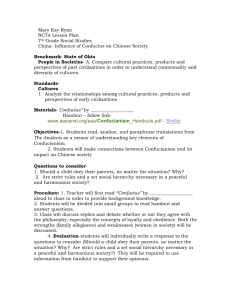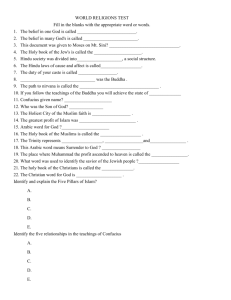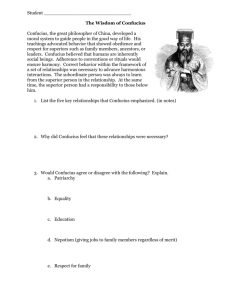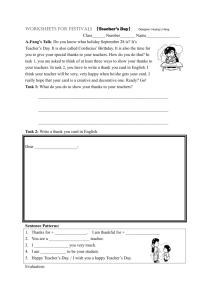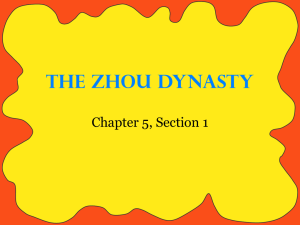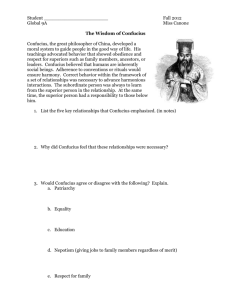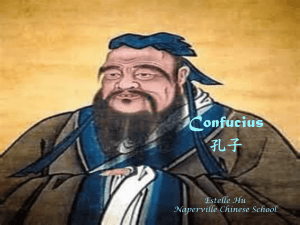One paragraph on the person's birth, childhood and background
advertisement
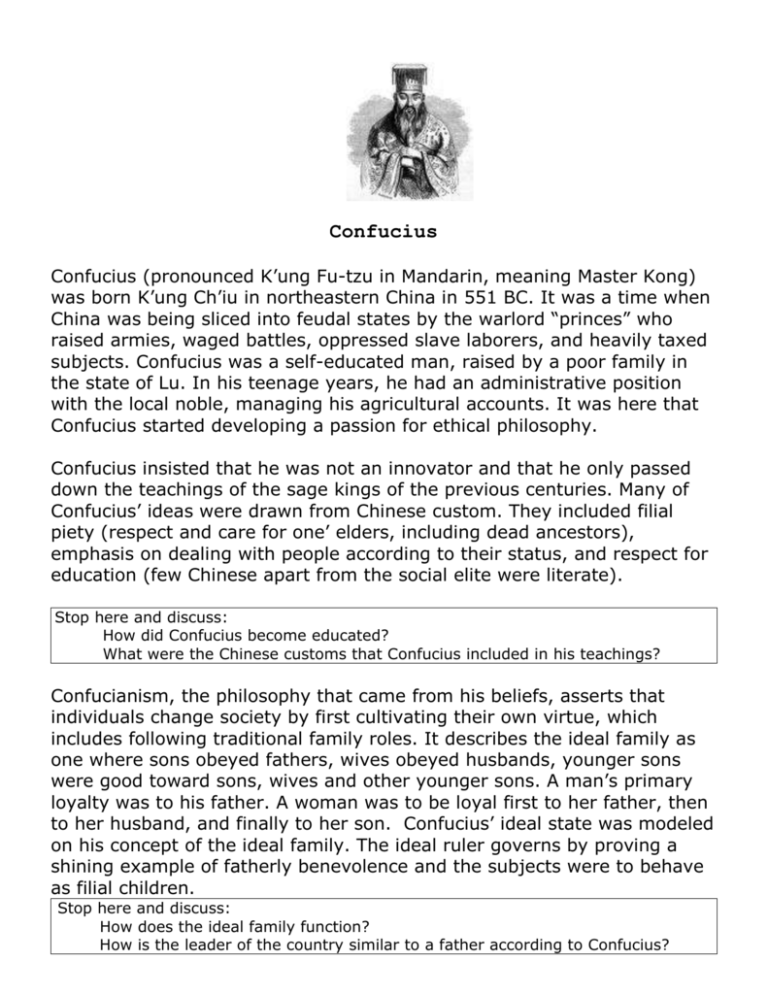
and S What Confucius Confucius (pronounced K’ung Fu-tzu in Mandarin, meaning Master Kong) was born K’ung Ch’iu in northeastern China in 551 BC. It was a time when China was being sliced into feudal states by the warlord “princes” who raised armies, waged battles, oppressed slave laborers, and heavily taxed subjects. Confucius was a self-educated man, raised by a poor family in the state of Lu. In his teenage years, he had an administrative position with the local noble, managing his agricultural accounts. It was here that Confucius started developing a passion for ethical philosophy. Confucius insisted that he was not an innovator and that he only passed down the teachings of the sage kings of the previous centuries. Many of Confucius’ ideas were drawn from Chinese custom. They included filial piety (respect and care for one’ elders, including dead ancestors), emphasis on dealing with people according to their status, and respect for education (few Chinese apart from the social elite were literate). Stop here and discuss: How did Confucius become educated? What were the Chinese customs that Confucius included in his teachings? Confucianism, the philosophy that came from his beliefs, asserts that individuals change society by first cultivating their own virtue, which includes following traditional family roles. It describes the ideal family as one where sons obeyed fathers, wives obeyed husbands, younger sons were good toward sons, wives and other younger sons. A man’s primary loyalty was to his father. A woman was to be loyal first to her father, then to her husband, and finally to her son. Confucius’ ideal state was modeled on his concept of the ideal family. The ideal ruler governs by proving a shining example of fatherly benevolence and the subjects were to behave as filial children. Stop here and discuss: How does the ideal family function? How is the leader of the country similar to a father according to Confucius? At a time when Socrates was studying the ethical philosophies of the Greek world, Confucius was popularizing a philosophy of ethical humanism. He argued that the best government is one that rules through "rites" and people's natural morality, rather than by using bribery and coercion. He felt if people actually believed in the government then they would not break the rules, and therefore not need to be punished. While he supported the idea of government by an all-powerful sage, ruling as an Emperor his ideas contained a number of elements to limit the power of rulers. He therefore supported the concept of Mandate to Heaven. The Mandate of Heaven argues that the heavens want the best ruler for the people so if the ruler at the time is too selfish, incompetent, or despotic them the Mandate of Heaven would transfer to another person. It was a way to curtail the abuse of power by the political rulers. It also allowed for a person not born of noble blood to take over and create a dynasty in order to end bad leadership. The threat therefore of removal of rulers provided an incentive for rulers to rule well and justly. Stop Aid To Stop here and discuss: Who was the ideal ruler according to Confucius? How did the concept of the Mandate of Heaven give more power to the people? Confucius’ teachings resided well with the leaders and people of China and as result from the 2nd Century B.C.E. to the 20th Century C.E., with occasional breaks and various degrees of emphasis, Confucianism was the official ideology of the dynasties which ruled China. He affected the social, political and philosophical structure of China for these years. By the time he died in 478 BC, K’ung Fu-tzu was considered, alongside Buddha, as one of the two greatest ethical minds in the East. After his death his disciples spread his teachings throughout East Asia, writing down his conversations, which he never had written down, in a book called The Analects. The book which are quotes of Confucius are mostly answers to questions that students posed. Today, his quotes are used in both the East and West to explain political and social conditions. Stop Stop here and discuss: What parts of society in China have been affected by Confucianism? How is Confucius similar to Socrates?

